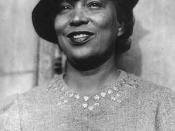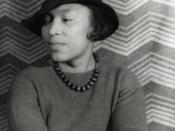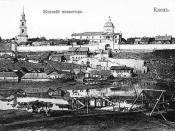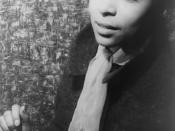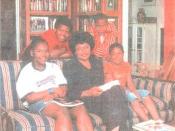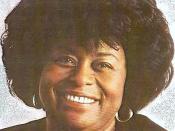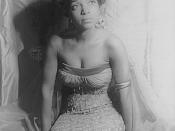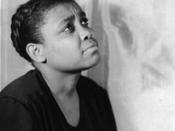In its critique of Ruby, Paradise confronts one of African American culture's most sacred cows, the myth of unity and perfection in black society relieved of white oppression. The myth is based on real, historical all-black (or largely black controlled) institutions and art forms. The allblack towns established by Exodusters (blacks moving west in the 1880s) and black churches, for example, showed African Americans governing themselves. Black art forms -- blues, gospel, folktales -- were recognized as African American contributions to world culture.
Intransigent racism produced both numerous pop culture versions of a romanticized Africa and, in the political realm, various separatist movements such as Marcus Garvey's back-to-Africa program. The novelist Zora Neale Hurston depicted the most widely known romantic vision of an all-black town in Their Eyes Were Watching God. (In fact, though many readers remember Hurston's Eatonville as Utopian, the literary presentation is actually more nuanced.) Of course, no real place could live up to the cultural myth, which nevertheless continues to have enormous emotional power.
Morrison critiques the myth by showing bitterly opposed forces within a black community not controlled by whites. In response to exclusion, Ruby is established as a separatist, specifically dark black community. Yet it generates its own patterns of exclusion. Most obviously, men and women are divided, and the attack on the Convent makes the battle of the sexes literal. Black men are warring on black women. (Only one of the five female victims is white.) The men of Ruby are also divided among themselves. While some attack, others try to restrain them. Paradise investigates the divergence between the social realities of a separatist establishment and an all-black Utopia.
The novel treats the origins of separatism sympathetically, but depicts it as ultimately destructive of the community that it is designed to protect. The novel locates the impetus for separatism in the experience of social exclusion, and not simply the exclusion of blacks by whites: Fairly, Oklahoma, an all-black town, will not accept Ruby's forefathers and mothers because their skin is too dark. In self-protection, this excluded group defines its own nature, goals, and values. But its processes of definition inevitably involve the creation of an "other" -- "them" as opposed to "us." Naturally, good qualities appear in us; evil qualities in them. The world is defined in absolute terms, with no middle ground, only binary opposites.
Ruby's most powerful men, Steward and Deacon Morgan, see the world through these oppositions: good versus bad, themselves versus the young hooligans, good young girls like Arnette versus bad ones like Billie Delia, Ruby versus the Convent. The problem here lies not just in the occasional misidentification -- Arnette rather than Billie Delia is sexually active -- nor even in the value itself (should sexual inexperience be a virtue). Instead, Paradise shows that opposed, mutually exclusive categories can never be maintained because they deny social complexity.
Ruby's separatism sets up the most important oppositions: Ruby versus the evil of the outside world, and Ruby versus the Convent. But in fact, Ruby participates in the structures of the larger world, both for good and for ill. While in South America, Mary Magna adopts an abandoned child, Consolata; on the trek to found Haven, Fairy DuPres insists that her group absorb the orphaned Lone. In New Jersey, Mavis's husband Frank beats her; in Ruby, K. D. beats his wife Arnette. Mavis loses her brothers and Soane loses two sons to the Vietnam War. Though the char-acters acters may not be aware of these similarities, the reader sees that the commonalities contradict separatist ideas.
All the characters must know, on the other hand, that Ruby and the Convent are connected on a daily basis. Ruby folk buy produce and baked goods from the Convent. Lone and Soane visit Connie as friends. Some meetings must remain hidden, however. Deacon, K. D., Menus, Arnette, and Billie Delia go for reasons that cannot be publicly acknowledged -- and all involve sexuality in some way. The Convent women accept those who come as lovers and generally try to help those in trouble. Precisely because Ruby must be perfect, the results of all imperfect behavior are siphoned to the Convent.
Demonizing the Convent women allows Ruby to ignore its homegrown sources of conflict. At the Fleetwood-Morgan marriage celebration, for example, families on the verge of renewing their quarrel instead agree on a substitute target -- the Convent women's dress and behavior at the reception. Anna Poole recognizes that "the Convent women had saved the day. Nothing like other folks' sin for distraction" (159). In a foreshadowing of the attack, Steward leads the group that orders the Convent women to leave. Listening to the men plan their attack, Lone later thinks, "So . . . the fangs and the tail are somewhere else. . . . [I]n a house full of . . . women who chose themselves for company . . . not a convent but a coven" (276). The bi-polar opposition of good versus evil, identified as Ruby versus the Convent, leads directly to violence.
Once begun, there's no end to such false oppositions. To maintain the opposition, individuals try to prove their own goodness by separating themselves from all who are evil or even questionable. This process splits families and even psyches. For example, when their approach to white oppression differs, the patriarch Zechariah disowns his twin, whose name is blotted out of the family Bible. In another instance, Patricia's need to prove that she is good enough for Ruby makes her mistreat her own daughter, Billie Delia. Sweetie Fleetwood accepts Deacon Morgan, who ignores her to open the bank, and rejects Seneca, who keeps her from freezing to death -- clearly insane standards necessary to maintain the Ruby/Convent divide.
Even Sweetie does not approach Arnette Fleetwood Smith's selfdelusion and psychic breakdown. Unable to admit that she tried to abort her pregnancy and abandoned her son, she says -- and probably believes -- that the Convent women forced an abortion on her. Separatism's necessary mechanism, bi-polar opposition, fragments society and leads to madness.
Haven's patriarchs did not invent bi-polar opposition, of course. The racism that ousted Zechariah from his position in government and the racism that barred his group from Fairly also rest on a bi-polar opposition: white = good; black = evil. Importantly, then, the Haven/Ruby patriarchs have not invented a new way of thinking. By exalting blackness, they have only inverted the values of the old way.
Paradise repeatedly demonstrates the falsity of separatism's oppositions. Consolata specifically denies the body/soul opposition central to Mary Magna's Catholicism. Recognizing the Virgin Mary and Eve as symbols of womanhood, divided into good and evil, Consolata rejoins them: "Never break them in two. Never put one over the other. Eve is Mary's mother. Mary is the daughter of Eve" (263).
The separation of Ruby from outsiders is supposed to keep its blood pure. Whatever this illusory purity is supposed to consist of, it cannot really be purely African. One of Haven's founders had an American Indian name, Drum Blackhorse. Straight hair appears in Soane and Dovey, then in Soane's twins. Further, the South America-born Consolata immediately connects Ruby's founders with her early companions: "And although they were living here in a hamlet, not in a loud city full of glittering black people, Consolata knew she knew them" (226). The artificial oppositions of separatism can never hold because reality is composed of mixtures, analogues, and connections. Ruby belongs to the world and the world to it.
Paradise. New York: Knopf, 1998.
